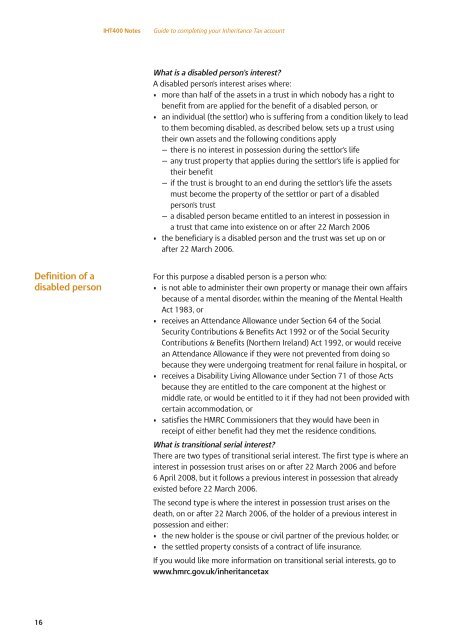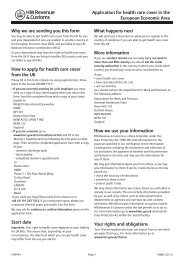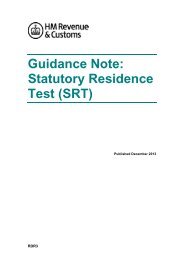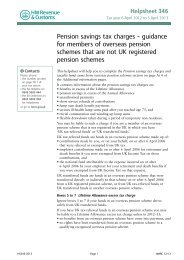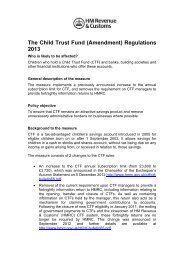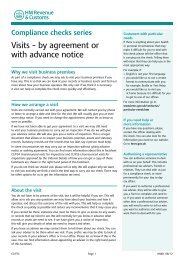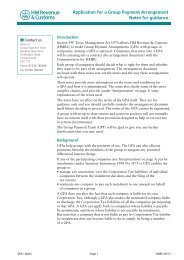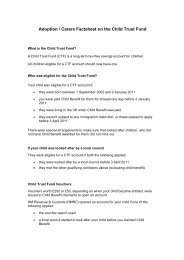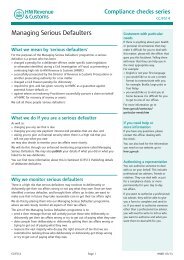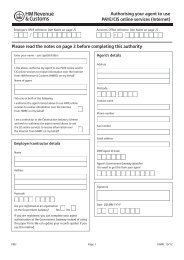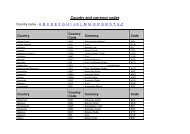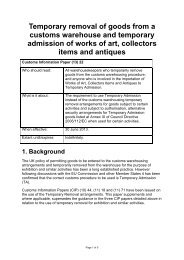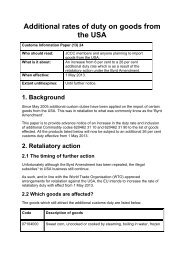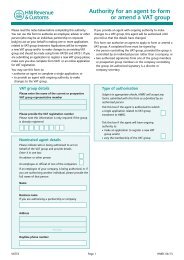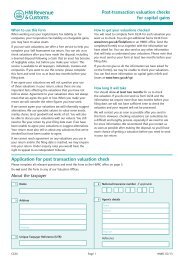IHT400 Notes : Guide to completing your Inheritance Tax account
IHT400 Notes : Guide to completing your Inheritance Tax account
IHT400 Notes : Guide to completing your Inheritance Tax account
You also want an ePaper? Increase the reach of your titles
YUMPU automatically turns print PDFs into web optimized ePapers that Google loves.
Definition of a<br />
disabled person<br />
16<br />
<strong>IHT400</strong> <strong>Notes</strong><br />
<strong>Guide</strong> <strong>to</strong> <strong>completing</strong> <strong>your</strong> <strong>Inheritance</strong> <strong>Tax</strong> <strong>account</strong><br />
What is a disabled person's interest?<br />
A disabled person's interest arises where:<br />
• more than half of the assets in a trust in which nobody has a right <strong>to</strong><br />
benefit from are applied for the benefit of a disabled person, or<br />
• an individual (the settlor) who is suffering from a condition likely <strong>to</strong> lead<br />
<strong>to</strong> them becoming disabled, as described below, sets up a trust using<br />
their own assets and the following conditions apply<br />
— there is no interest in possession during the settlor's life<br />
— any trust property that applies during the settlor's life is applied for<br />
their benefit<br />
— if the trust is brought <strong>to</strong> an end during the settlor's life the assets<br />
must become the property of the settlor or part of a disabled<br />
person's trust<br />
— a disabled person became entitled <strong>to</strong> an interest in possession in<br />
a trust that came in<strong>to</strong> existence on or after 22 March 2006<br />
• the beneficiary is a disabled person and the trust was set up on or<br />
after 22 March 2006.<br />
For this purpose a disabled person is a person who:<br />
• is not able <strong>to</strong> administer their own property or manage their own affairs<br />
because of a mental disorder, within the meaning of the Mental Health<br />
Act 1983, or<br />
• receives an Attendance Allowance under Section 64 of the Social<br />
Security Contributions & Benefits Act 1992 or of the Social Security<br />
Contributions & Benefits (Northern Ireland) Act 1992, or would receive<br />
an Attendance Allowance if they were not prevented from doing so<br />
because they were undergoing treatment for renal failure in hospital, or<br />
• receives a Disability Living Allowance under Section 71 of those Acts<br />
because they are entitled <strong>to</strong> the care component at the highest or<br />
middle rate, or would be entitled <strong>to</strong> it if they had not been provided with<br />
certain accommodation, or<br />
• satisfies the HMRC Commissioners that they would have been in<br />
receipt of either benefit had they met the residence conditions.<br />
What is transitional serial interest?<br />
There are two types of transitional serial interest. The first type is where an<br />
interest in possession trust arises on or after 22 March 2006 and before<br />
6 April 2008, but it follows a previous interest in possession that already<br />
existed before 22 March 2006.<br />
The second type is where the interest in possession trust arises on the<br />
death, on or after 22 March 2006, of the holder of a previous interest in<br />
possession and either:<br />
• the new holder is the spouse or civil partner of the previous holder, or<br />
• the settled property consists of a contract of life insurance.<br />
If you would like more information on transitional serial interests, go <strong>to</strong><br />
www.hmrc.gov.uk/inheritancetax


